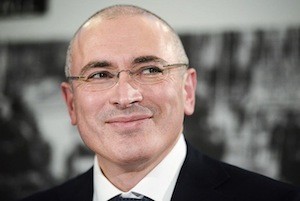MOSCOW, RUSSIA. Over two months have passed since the early morning December 21, 2013, when former oil tycoon and formidable political critic of the Kremlin, Mikhail Khodorkovsky was released from jail. He immediately gave a press conference in Berlin and various interviews to media agencies. Then came the “silence” and “disappearance” of the man who during his 10 years of imprisonment had become the symbol of dissidence over the political course of Putin’s Russia.
The decade in Russian prison – one of the circles of Dante’s Inferno could break anyone, but not him. Being pardoned by Putin and the immediate release were unexpected surprises even for himself. As later admitted by Khodorkovsky the years in prison taught him not to cherish the hope of returning to freedom one day.
The reasons of Putin’s amnesty for his enemy can be discussed. Common explanations include: the deteriorating international political image of Russia; bargain with the West; need for foreign investments; the Sochi Olympics; Putin’s desire to transform his personal image from a tyrant to a merciful leader. It is also argued that there exist certain conditions, which Khodorkovsky was forced to accept in exchange for his release. Khodorkovsky’s announcement at the Berlin press conference, being in a great shape and dressed immaculately, that he plans to refrain from politics and the fact that he abandoned Russia, may serve as proof for this argument.
Since his release Khodorkovsky does periodically speak out in support of political prisoners and he gave his opinions about various events political significance. Furthermore, he published entries on his official website (khodorkovsky.ru) and his personal blog on the web page of the Echo of Moscow radio station. Nevertheless, it is clear that Khodorkovsky is far from uttering the same criticism with which he dared to confront Kremlin before. He has become more cautious. In a rare recent interview with a Russian newspaper in Zurich, the place where he currently lives with his family, he avoids political topics and is more so speaking about his personal past. Quite different from the articles he wrote while in jail, when he spoke of social justice, corruption and atrocities of Putin’s Russia.
Khodorkovsky has now been compared to Nelson Mandela and Alexander Solzhenitsyn by his supporters. However, after his release, he seems to intend to limit his activities to non-political interests, as he has no plans to engage in neither business nor politics, though admitting to dedicate the rest of his life working for the release of other political prisoners.
His political abstinence and cautiousness supports the argument of the existence of some “non-aggression pact” with the Kremlin, a deal that involved mutual obligations. On one side the grant of amnesty and the guarantee of the physical security of Khodorkovsky and his family, on the side a promise to file no legal claims for obtaining the former Yukos assets which had been nationalized by the Russian government.
Due to an agreement or not, the withdrawal from the position of fearless regime critic caused deception among his supporters. In him they envisioned their symbolic leader in their fight for changes in Russia.
Don’t be fooled. Khodorkovsky is intelligent. He perfectly understands that he does not represent a danger to the Russian system, at least like he could in early 2000s. Financing opposition parties, as he did before imprisonment, has little sense now, as present-day opposition is powerless in front of the governmental political machine. Therefore, he would hardly fit in the current political scene or create any remarkable changes.
Furthermore, he likely wishes to spend time now with his family. After experiencing spectacular rises and fall, he indeed could have preferred to step down and distance himself, at least for some time, from the realities of present-day Russian politics.
Khodorkovsky also knows that in the minds of a large percentage of the Russian population he will always remain known as one of the oligarchs, responsible for injustices during the 1990s privatization era, irregularly appropriating national assets and wealth, rather than a national hero or symbol of justice.
The real reasons of his cautiousness are unknown yet. Patience and time are the only solutions that may give answers to the puzzling behavior of Khodorkovsky. Maybe he is still just making up his mind.

